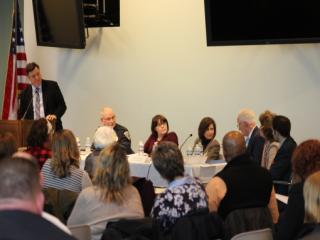Office of Consumer Affairs and Business Regulation, Executive Office of Elder Affairs, Middlesex County District Attorney and Division of Banks Lead Collaborative Effort to Combat Elder Financial Exploitation

BOSTON –The Office of Consumer Affairs and Business Regulation, the Executive Office of Elder Affairs, the Middlesex County District Attorney, and the Division of Banks hosted a briefing and leadership forum on elder financial abuse to educate Massachusetts residents on how to identify and prevent elder financial abuse. Individuals over the age of sixty (60) comprise the most rapidly growing segment of our population and are particularly vulnerable to financial exploitation and abuse.
“It is crucial for relatives, caregivers, financial institutions, and law enforcement to recognize the signs of financial exploitation,” said Consumer Affairs Undersecretary John Chapman. “Elders are a common target for scams and abuse and may not be aware that it is occurring or may be reluctant to report it. The goal of today’s forum was to educate various members of our communities on the many ways elder financial abuse can occur and what indicators they should be on the lookout for in order to spot it.”
“Financial fraud and exploitation can lead to devastating consequences for older people and it is a growing public health concern as our population ages,” said Secretary of Elder Affairs Alice Bonner. “We can all do something to protect ourselves, those we love and our communities from the impact of financial abuse and exploitation. Raising awareness is the first step in prevention and that’s why events like this are so important.”
According to the National Adult Protective Services Association only one in 44 cases of financial abuse are reported. Those committing the crimes are most often people close to elders, such as family members or caregivers.
“Education is the best tool to ensure that law enforcement officials, government and banking representatives and elder services organizations have the most up to date information to protect our seniors. Through multi-agency cooperation we work to not only prevent these types of crimes, but more importantly to foster a sense of community and trust that encourages seniors to reach out in the event they feel they may have been the victim of financial abuse,” said Middlesex District Attorney Marian Ryan.
The Executive Office of Elder Affairs and the Division of Banks, in collaboration with the Office of the Attorney General, Massachusetts Bankers Association, and the Cooperative Credit Union Association, also led an update and re-launch of comprehensive compilation of training materials to assist Massachusetts banks and credit unions in detecting and preventing elder financial abuse.
“Bank and credit union employee awareness is the key to detecting financial exploitation,” said Division of Banks Commissioner Terence McGinnis. “These training materials provide bank tellers and other front line staff with important information about how to recognize the warning signs of potential elder financial abuse.”
Financial institutions are advised to designate a point person responsible for handling suspected financial exploitation working with the state’s various protective service agencies or law enforcement.
Some Typical Signs of Elder Financial Abuse Risk Include:
- Unusual account activity including large withdrawals and increased ATM usage.
- Adding a co-signer to an elder’s account.
- Attempts by a third party to access an elder’s account to make withdrawals.
- Requests made to elder for forms to be notarized.
- Closing of Certificate of Deposit accounts without regard to penalties.
- The appearance of forged or suspicious signatures.
- Attempts to wire transfer large sums of money.
- Sudden changes made to wills.
- Unpaid bills or notices of utility shut-offs or eviction.
- Family, friends or caregivers taking unanticipated interest in an elder’s finances.
- Explanations by elder of solicitations that sound too good to be true.
- Increased confusion about or reluctance to discuss banking and financial matters.
More information on bank and credit union training manuals and financial reporting requirement can be found on the Division of Banks’ website.
More information about how to report Elder Abuse can be found on the Executive Office of Elder Affairs website or by contacting the Commonwealth’s Elder Abuse Hotline at 800-922-2275.

